Old Browser
This page has been recently translated and is available in French now.
Looks like you're visiting us from {countryName}.
Would you like to stay on the current country site or be switched to your country?



.png)

Analysis of MEK1 in HeLaS3 cells. HeLaS3 cells were either transfected with MEK1 RNAi (open histogram) or untreated (shaded histogram). The cells were fixed (BD Cytofix™ Fixation buffer, Cat. No. 554655) for 10 minutes at 37°C, then permeabilized (BD Phosflow™ Perm Buffer III, Cat. No. 558050) on ice for 30 minutes, and then stained with PE Mouse anti-MEK1 (Cat. No. 560099). Down-regulation of MEK1 expression is evident in the RNAi-transfected cells. Flow cytometry was performed on a BD™ LSR II flow cytometry system.

.png)

BD™ Phosflow PE Mouse anti-MEK1

BD™ Phosflow PE Mouse anti-MEK1
.png)
Regulatory Status Legend
Any use of products other than the permitted use without the express written authorization of Becton, Dickinson and Company is strictly prohibited.
Preparation And Storage
Recommended Assay Procedures
Either BD Cytofix™ fixation buffer or BD Phosflow™ Fix Buffer I may be used for cell fixation.
Product Notices
- This reagent has been pre-diluted for use at the recommended Volume per Test. We typically use 1 × 10^6 cells in a 100-µl experimental sample (a test).
- An isotype control should be used at the same concentration as the antibody of interest.
- Source of all serum proteins is from USDA inspected abattoirs located in the United States.
- For fluorochrome spectra and suitable instrument settings, please refer to our Multicolor Flow Cytometry web page at www.bdbiosciences.com/colors.
- Caution: Sodium azide yields highly toxic hydrazoic acid under acidic conditions. Dilute azide compounds in running water before discarding to avoid accumulation of potentially explosive deposits in plumbing.
- Please refer to www.bdbiosciences.com/us/s/resources for technical protocols.
Companion Products
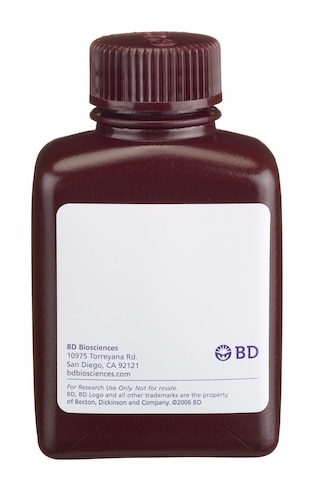
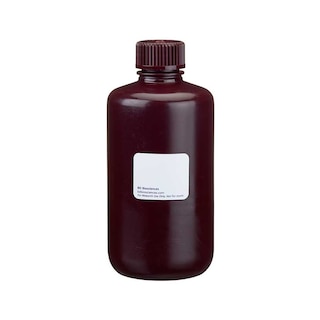
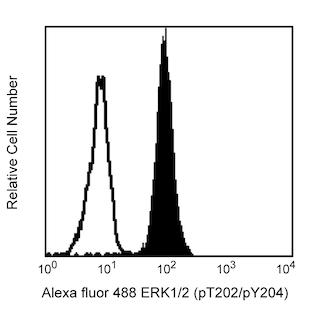
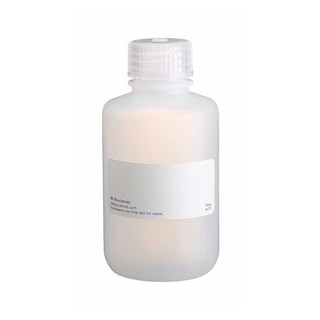
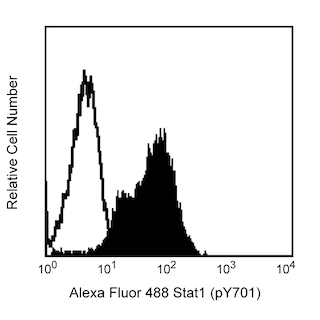
.png?imwidth=320)
MEK1 (MapK/ERK Kinase 1) is a 45-kDa member of the MEK family of dual specificity kinases. MEK is activated by a variety of cellular serine/threonine kinases including c-Raf, A-Raf, c-mos, and MEK Kinase-1. Activated MEK phosphorylates MAP kinase (ERK) at threonine and tyrosine residues. This results in activation of ERK and its signaling pathway. MEK is highly specific for ERK and various MEKs preferentially phosphorylate individual ERK isoforms. MEK1 only activates ERK1 and ERK2. This specificity may result from variations in ERK regions that are known as the phosphorylation lip and kinase backbone. MEK's localization is cytoplasmic, but mitogenic stimulation induces a mass translocation to the nucleus. Mechanisms behind this nuclear translocation remain unknown. However, MEK contains an N-terminal nuclear export signal (NES) that mediates its rapid exodus from the nucleus and restores its unstimulated cellular distribution.
The 25/MEK1 monoclonal antibody recognizes MEK1, regardless of phosphorylation status.
The specificity of this antibody conjugate for flow cytometric analysis was validated by confirming that RNA-mediated interference (RNAi) of the specific protein reduced the staining of the cells (see figure). Furthermore, the capacity of the RNAi to down-regulate the expression of the relevant protein was confirmed by western blot analysis.

Development References (4)
-
Aplin AE, Stewart SA, Assoian RK, Juliano RL. Integrin-mediated adhesion regulates ERK nuclear translocation and phosphorylation of Elk-1. J Cell Biol. 2001; 153(2):273-282. (Biology: Immunofluorescence, Western blot). View Reference
-
Gu J, Fujibayashi A, Yamada KM, Sekiguchi K. Laminin-10/11 and fibronectin differentially prevent apoptosis induced by serum removal via phosphatidylinositol 3-kinase/Akt- and MEK1/ERK-dependent pathways. J Biol Chem. 2002; 277(22):19922-19928. (Clone-specific: Western blot). View Reference
-
Robinson MJ, Cheng M, Khokhlatchev A, et al. Contributions of the mitogen-activated protein (MAP) kinase backbone and phosphorylation loop to MEK specificity. J Biol Chem. 1996; 271(47):29734-29739. (Biology). View Reference
-
Short SM, Boyer JL, Juliano RL. Integrins regulate the linkage between upstream and downstream events in G protein-coupled receptor signaling to mitogen-activated protein kinase. J Biol Chem. 2000; 275(17):12970-12977. (Clone-specific: Immunoprecipitation, In vitro kinase assay, Western blot). View Reference
Please refer to Support Documents for Quality Certificates
Global - Refer to manufacturer's instructions for use and related User Manuals and Technical data sheets before using this products as described
Comparisons, where applicable, are made against older BD Technology, manual methods or are general performance claims. Comparisons are not made against non-BD technologies, unless otherwise noted.
For Research Use Only. Not for use in diagnostic or therapeutic procedures.
Report a Site Issue
This form is intended to help us improve our website experience. For other support, please visit our Contact Us page.